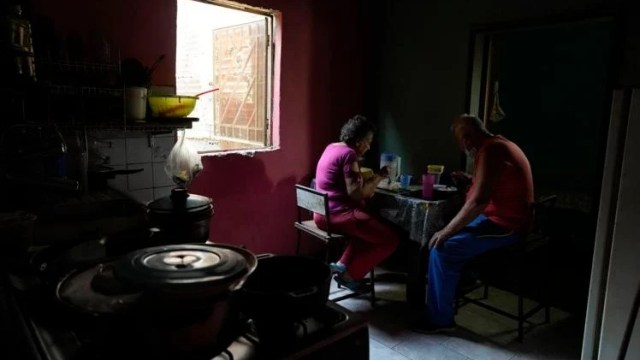
Maybel Sequera and Juan González recently shared for lunch a plate of noodles and beans at their home in a low-income neighborhood west of Venezuela’s capital.
By Santa María Times –
Apr 9, 2022
When lunchtime comes, Maybel Sequera and Juan González share a plate of noodles and beans at their home in a low-income neighborhood west of Venezuela’s capital. Their meager lunch was a gift from a nonprofit organization as the couple cannot afford to feed themselves.
Sequera, 72, and González, 74, worked for years as a seamstress and driver to build their two houses and raise their four children. But now, after 50 years of marriage, they rely on donations for food, medicines and clothing.
The government raised their combined monthly pensions from about $4 to roughly $60 last month. But it would have to be multiplied by six for them to be able to buy a basket of goods.
“Now that they have increased us to 130 (each), we are going to see how we manage with those 130 because it is not enough either,” Sequera said referring to the pension in bolívares, Venezuela’s official currency and in which pensions are paid.
In Venezuela, the pension is the amount paid monthly to workers who retire after reaching 750 weeks of Social Security contributions and turning 55, in the case of women, and 60 for men.
Since 1995 – years before Hugo Chavez imposed in the South American country what he considered socialism – a pension is equal to the monthly minimum wage. Workers contribute between 2% and 4% of their salary to Social Security while employers pay an additional 9% to 11% on behalf of workers.
The pensions of Sequera, González and millions of other similarly situated retirees went up last month because President Nicolás Maduro increased the monthly minimum wage from roughly $2 to about $30, an amount insufficient to pay basic goods, whose cost in February was estimated at $365, according to the Venezuelan Finance Observatory, an organization specializing in economic studies.
Venezuela has just over five million pensioners, according to official figures. Annual inflation, which slowed last year but still reached 686.4%, has eaten up their pensions for years.
Although the country in the second half of the last decade experienced a severe shortage of food and hygiene items, prompting people to stand in long lines outside supermarkets to buy whatever they could, store shelves are now well stocked and display imported products. But high prices set in dollars make it impossible for much of the population to afford goods.
“I have to manage to get food. It’s not easy, because you’re of an age, you go out on the street and many people look at you with contempt,” Miriam Jiménez, 68, told The Associated Press after picking up a plate of food at a soup kitchen for the elderly in western Caracas. “One has to beg in the streets. Sometimes, a neighbor gives me something.”
In other South American countries, pensions range from $230 to $650, but the amounts are also usually below the cost of a basket of basic goods or the monthly minimum wage. In Chile, new President Gabriel Boric promised to raise the amount to $310, although it will remain below the $435 monthly minimum wage.
Luis Francisco Cabeza, director of Convite, a non-governmental organization focused on care for the elderly in Venezuela, said social security for the elderly population should not just be a pension. He said it should also include access to medicines, medical care and recreation.
“The pension is a system that seeks to protect you against the contingency of reaching old age,” he added. In Venezuela, the hospital system is precarious, so patients must bring all medical supplies to be treated.
Sequera has been diagnosed with two types of cancer this year, including a type of skin cancer that required an operation on her face. To pay for medical supplies, she sold two of her three sewing machines, which she used to mend neighbors’ clothes in exchange for money.
Sequera and González had a cup of coffee after finishing the plate of noodles and beans for lunch.
“Today, (at breakfast) we ate the last little egg. We are going to wait for another blessing to come out there,” González said.
“For the night, God will provide,” his wife interjected. “And if not, a glass of water and go to sleep,” González lamented.
…
Read More: Santa María Times – Pension hike not enough for Venezuelans to afford basic food
…

